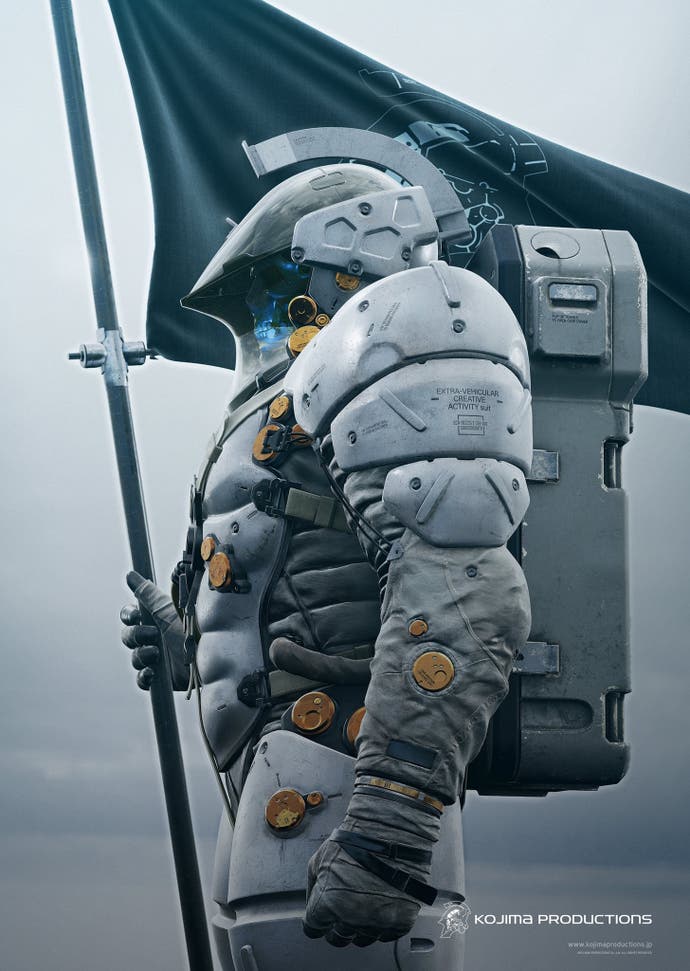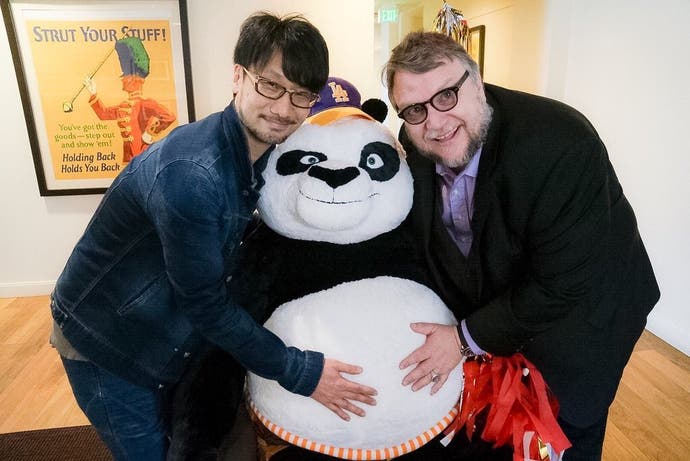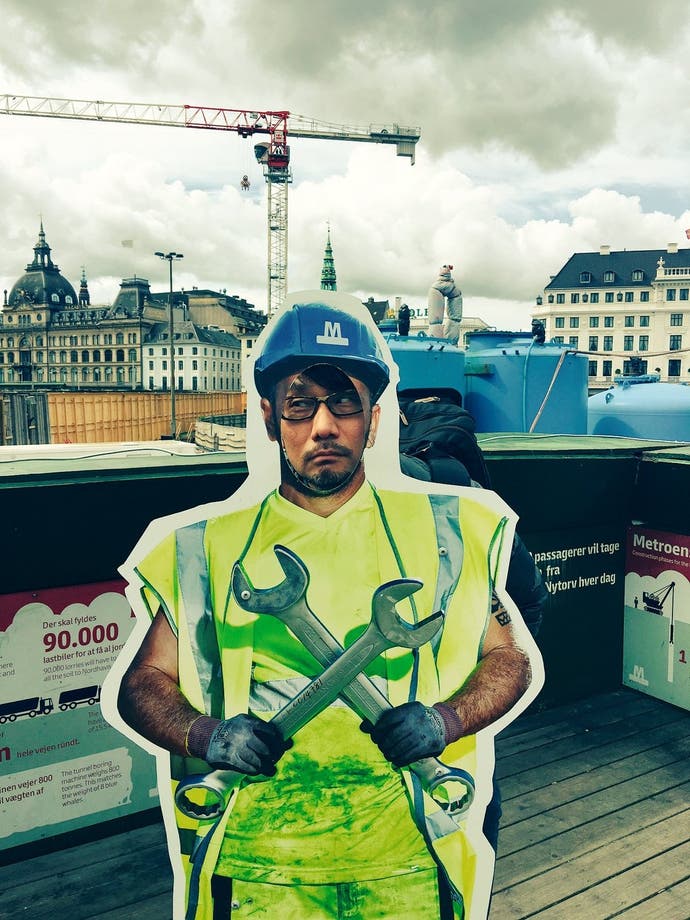On the road with Hideo Kojima
What's Kojima learnt from his world studio tour? “You to have to get the kitchen right…”
Since Hideo Kojima's contract with Konami ended on December 16th, the director has embraced freedom with the unmistakeable gusto of the recent divorcee. His Twitter feed is a flick-book of selfies with Hollywood actors and directors in exotic locales, interspersed with photographs of plates of expensively arranged food. After 25 years cooped up at Konami, with all of its corporate strictures and sign-offs, Kojima is relishing liberty.
He describes the studio he has founded, Kojima Productions, as 'indie', even if it benefits from Sony's support. "Sony has just left everything to me," Kojima tells me backstage, with a gleeful smile, after addressing a packed auditorium of fans in Malmo, Sweden. "I have the perfect arrangement with them."

The exact nature of Sony's relationship with the Kojima Productions is unknown - although the fact that the studio's first game will be a PlayStation 4 exclusive indicates that serious money is involved. "It's an arrangement that's come from years of working together, which has built trust," he says at an earlier roundtable. "It's not normal for our industry." Details remain scant. Kojima claims that the new project is a "previously unknown type of game." Beyond that, he is keeping the exact location of the studio's premises in Tokyo a secret, and will not say how many staff are currently employed for fear that a competitor - or jealous ex, no doubt - is stalking them.
This secrecy contrasts with Kojima's openness about his grand vision for the company. The past six months spent on the road (in part the victory lap denied to him following his immediate exit from Konami after finishing Metal Gear Solid 5 in October) have been spent "trying to find the right technology for my new game". After all, Kojima left Konami with nothing but a few devoted staff. In the beginning, he tells me, his first employees didn't even have PCs; they had to try out design ideas for the new game using nothing but paper and figurines.
As well as being a keynote speaker at events such as the Nordic Game Conference, appearances that have presumably funded his travel, much of Kojima's skittering road trip has been spent meeting with the manufacturers of middleware game engines, the kinds of off-the-shelf technology that can enable a start-up to produce results quickly. "We're trying to see which of the current middleware engines on the market best suits this kind of new game we're trying to make," he says. "I also have to take into consideration the graphical style we want. Every game engine has its own slightly distinctive look, so it's also a case of finding which one best suits the vision."
Kojima has also visited scores of game studios to see what ideas and working practices he wants to carry back home. (During his week in Sweden, for example, Kojima dropped in on Mojang, DICE and Massive Entertainment). Kojima Productions, which was founded in 2005, disbanded a decade later and then, presumably after some haggling with Konami over the name, re-launched in December, is a blank opportunity. "I now know that I want an intimate kind of studio," says Kojima, of what he has learned on the road to date. "Media Molecule in London is the closest to what I want.

"Typical Japanese companies are like armies. There is a hierarchy. Orders filter down. Media Molecule is nothing like that. There are lots of women working there, for one thing. That's a strange feeling! But at the same time there's a feeling like it's family there. I want that for my company." One thing Kojima has noticed, on his travels, is the centrality of the kitchen in many successful studios. "At DICE, for example, they have 40 microwaves, and so many coffeemakers. Media Molecule told me that the kitchen is crucial too. You to have to get the kitchen right..."
While Kojima has worked on smaller projects during his career, such as Boktai and Snatcher, he is best known for his blockbusters, and admits that there is a certain expectation from his fans that his first game matches the grandeur of his best-selling work. In a recent interview he stated that his new game will be a more modest or, perhaps, more manageable project than Metal Gear Solid 5, which was long delayed. He is insistent, however, that the new game will be an equally ambitious one. "It's not going to be 'big' in the sense of scale, but it will be in terms of emotional impact, I hope," he says. "I want the game to change its players' lives in some way. We are independent, but we are aiming for the same kind of quality and scale as major teams out there."
Kojima is also adamant that his company will never grow to the size of a Konami. "Even at the time of the first Metal Gear Solid we had more than 200 people," he says. "When things get that large it becomes a huge undertaking just to organise meetings. I want to stay small enough that we don't even need meetings; I can just talk to the staff directly. I think a hundred people is about the limit for that way of working." The director also believes that, when a studio expands too much, employees are unable to see how their work fits into the context of the whole. "In larger studios staff don't have a holistic view of how games are made. They become experts in their one area, but they don't understand necessarily how it fits into the bigger picture. I want my staff to understand how everything fits together."
As the Japanese video game industry has declined during the past 15 years, there have been many high-profile departures of senior staff members who, in many cases, have founded independent studios. These men have dealt with the disorientating effect of moving from the security of a Japanese corporation to independence in different ways, and with varying degrees of outspokenness. Square Enix founder Hironobu Sakaguchi fled to Hawaii where he made a game about his surfing habit, giving only the odd polite interview. Sony's Fumito Ueda quietly went freelance, continuing work on his still uncompleted game, The Last Guardian, in something of a media blackout. Capcom's Keiji Inafune, meanwhile, has slouched on sofas around the world, lyrically slagging-off his former employer.

Kojima, while spending the majority of his time visiting western studios on his road trip, is only now beginning to comment upon Japanese working conditions in the video game industry. "In Japanese companies there's not so much respect given to the creators," he says. "American and European companies try to draw out the best of their people, and make them a success and, through that, make the game a success."
In Japan, by contrast, the primary focus is on the commercial side of the process. "It's all about how much money a game is going to make and all those kinds of calculations. Executives seem less interested in the contents of the game. That hurts the art." The director is keen to invest in talent in a way that effects change. "Kojima Productions is not going to be the kind of Japanese company that people give their lives to. I have no plan for keeping people working for me for twenty years from now. Talented people should be able to go out into the world, to create things under their own names. I hope to facilitate that."
It's a statement that seems vaguely at odds with a career in which the director has accepted the majority of the glory and recognition for his teams' efforts. It takes a village to make a blockbuster. Yet, other than Yoji Shinkawa, the art director whom Kojima plucked from college in the mid-1990s and has worked alongside ever since, few names of those who have worked on the Metal Gear Solid series are well known. "Many people are involved in making games, of course," Kojima says. "Those people who did distinctive work in their area, they got recognised within the team first, then the players notice." In some cases, such as that of the 3D artist who helped model the studio's futuristic knight mascot, Kojima believes that publicising a team member's work may put too much pressure on them. Some prefer to work in relative anonymity.
For all Kojima's eagerness to change the Japanese studio's way of working, his belief in the ever-presence of a vision-holder remains resolute. "There are risks to spreading your work too thinly," he says. "For example, I'm a big fan of Nick Park, the director from Aardman. He took seven years to make his first film, using stop motion. The outcome was brilliant." After the success of A Grand Day Out, Park Park received an offer from DreamWorks to make a blockbuster film. "The studio didn't want to wait seven years for their film," says Kojima, "so they split the work between numerous production companies. The idea was to create the same amount of film in just 18 months."
Park spent his time travelling between the different studios, overseeing the work. "You could see the difference in the results, says Kojima. "Chicken Run, wasn't as impressive as Park's earlier work. Something was lost." For Kojima it's a cautionary tale not to over-reach, but also, not to under-deliver. "I'm trying to find the middle ground between the super intricate, long-term work, and the fast production. We can't wait seven years for my next game. But the danger is that if I try to rush it out, it won't be what people want either."

